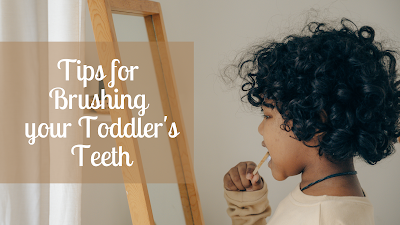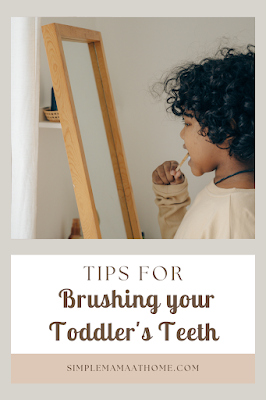Are you faced with a daily struggle when trying to brush your toddler's teeth? You are not alone. Getting toddlers to brush their teeth can be quite overwhelming and chaotic for any parent. Yet it is so important that their teeth be cleaned at least twice a day in order to remove leftover food and plaque that builds up overnight or throughout the day.
**This post contains affiliate links and I will be compensated if you make a purchase after clicking on my links.
Both daytime and nighttime brushing are equally as important. Brushing in the morning helps to take away that not so pleasant morning breath as well as removing the plaque that develops overnight. Brushing at night ensures that there isn’t any sugar lingering on the teeth during sleep. As well if you have a child who breathes through the mouth during sleep resulting in a dry mouth this makes it a wonderful environment for the bacteria in their mouth to prosper. Making sure the teeth are clean helps limit the bacteria’s access to sugar which helps prevent cavities.
Brushing a young child’s teeth isn’t always easy, but it is essential to establish, and maintain, a good oral healthcare routine to keep your child’s mouth healthy and prevent potentially serious infections. Here are 10 tips for brushing your toddler's teeth.
1. Toothbrush suitable for children
It's important to choose a toothbrush designed especially for children aged 2-5 years. These toothbrushes have small oval heads, soft bristles and non-slip, cushioned handles. They also often have cartoons and fun designs on the handle, which your child might like.
2. Fluoride toothpaste
Squeeze a very small amount similar to the size of a grain of rice for children under the age of three and a pea-sized portion of fluoride toothpaste for children over three years of age. It is best to use an age appropriate tooth paste. Toothpaste for young children has less fluoride in it as young children tend to swallow it rather than spit it out. Try to choose one with a flavor that your child likes as this can make a world of difference.
3. Lead by example
Make it a habit of brushing your teeth with your toddler every single day. By doing so, you’re giving him or her the impression that it is a fun thing to do with the family and there is really nothing to fear. This also lets your little one that these rules apply to everyone and it’s good to be passionate and excited about brushing one’s teeth.
4. Routine pattern
Follow a routine pattern to brush the outer surface, inner surfaces, and chewing surfaces of the teeth in small circular motions making sure to brush at the gumline.
5. Help them brush
Toddlers are well known for having a very short attention span, so it’s expected that they only want to brush for a few seconds and be done with it. So even if brushing has to be quick, you can still guide them on how to brush properly. Let them try on their own to build a sense of independence, while being there to help as needed.
6. Read
There are so many different books about brushing teeth available. Books are a simple way to explain to toddlers why they need to brush their teeth. They may be better able to understand the need to brush their teeth when reading while relaxed and calm.
7. Start slow
Take small steps and work on getting your toddler used to cleaning his/her mouth. This could mean setting goals of 30 seconds at first, then 60 seconds, and so on, before finally working up to the full 2 minutes of recommended brushing.
8. Brush in front of a mirror
Brushing in front of a mirror allows your toddler to be able to see what is going on while brushing. Most children enjoy looking at themselves while doing something new. Looking in a mirror while brushing teeth allows them to take pride in their appearance including admiring their pearly whites.
9. Use rewards
If your child fights and screams through brushing, and you feel like you have done all you can then a reward can really help both of you. Items such as stickers, bubble wands, and other small prizes are inexpensive and usually excite small children.
10. Give praise
When they do brush independently and enthusiastically, give them lots of praise and tell them how good they are doing. Praises encourage children to strive harder and do more.
What are some tips you have for brushing your toddler's teeth?










0 Comments